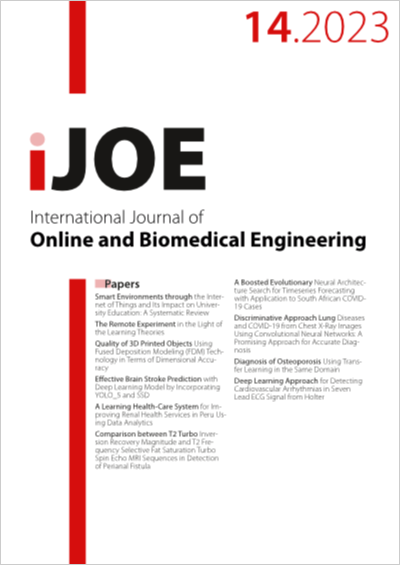The Remote Experiment in the Light of the Learning Theories
DOI:
https://doi.org/10.3991/ijoe.v19i14.43163Keywords:
Distance education and online learning, Cooperative/collaborative learning, Secondary education, Pedagogical issues, Teaching/learning strategiesAbstract
The interference of technology in education requires the development of new theories of learning. The paper analyzes connectivism as the most important representative of the theories related to the “digital age.” From the point of view of the environment, called a remote experiment, learning occurs initially at the individual level, encompassing all three classic theories of learning: behaviorism, cognitivism, and constructivism. It shows that the virtual environment has introduced a powerful lever of imbalance for the real environment. This is how we arrived at the explanation of learning theories in real-virtual environments through the theory of chaos or complex environments. Like any knowledge storage network with nodes between which connections can be made, even the remote experiment is subject to random laws. The addition of knowledge is not simply the sum of the effects produced by each individual node (the system is not linear). A distinction is made between information and knowledge. Even if the information in the nodes can be read, this aspect does not represent learning. The remote experiment not only expanded the realm of knowledge but also emphasized the critical role of time. The time remained constant, while the amount of information increased. The teacher, as a knowledge synthesizer, can help orient the student to this vast amount of information, especially when time is limited. Additionally, the student can also play an active role in organizing and systematizing the information. Two examples of experiments are given, which, being inter- and transdisciplinary, can contribute to the introduction of the elements of non-linearity and unpredictability as a method of designing the educational environment, precisely to be able to transform it into a thinking system suitable for the mixture between real and virtual environments in which we live more and more intensely.
Downloads
Published
How to Cite
Issue
Section
License
Copyright (c) 2023 Doru Ursutiu, Prof.Dr.Eng. Cornel Samoila, Florin Munteanu

This work is licensed under a Creative Commons Attribution 4.0 International License.



